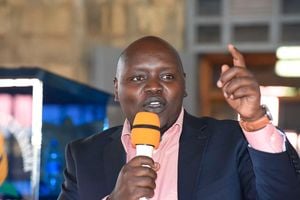Collins Otieno: Political goodwill key to COP29 success

Collins Otieno, a Climate Finance and Innovations Officer at Hivos.
What you need to know:
- COP 29 will address ambitious NDCs to meet the Paris Agreement’s goals of limiting global warming to well below 2 degrees Celsius, with efforts to cap it at 1.5 degrees Celsius.
- Current global temperatures are dangerously close to breaching these limits.
Climate negotiations are often viewed as technical and expert-driven dialogues, but they are much more than that. In global climate meetings, technical negotiators manage complex details, while political leaders push for bold actions and meaningful outcomes.
Historical decisions, such as the Kyoto Protocol, the Paris Agreement, the Copenhagen climate finance commitment, the Durban Platform, and the Green Climate Fund, have shown that political decisions can significantly shape global climate action.
Without downplaying the need and essence of technical negotiations and expert dialogues in any way, these political decisions shaped and continue to shape global climate action, and such will be needed if COP 29 is to deliver positive outcomes.
Dubbed a climate finance year, 2024 will see the UN Framework Convention on Climate Change (UNFCCC) focus on climate finance to set a New Collective Quantified Goal on Climate Finance (NCQG) from a minimum of USD 100 billion per year to support climate action in developing countries.
Similarly, COP 29 will see the critical and perceived onset discussions on ambitious Nationally Determined Contributions (NDCs) to meet the Paris Agreement goals, an action that must start from COP 29 through a stronger global political will. The Paris Agreement aims to limit global warming to 2 degrees Celsius above pre-industrial levels, with efforts to keep it to 1.5 degrees Celsius.
Additionally, COP 29 will address ambitious NDCs to meet the Paris Agreement’s goals of limiting global warming to well below 2 degrees Celsius, with efforts to cap it at 1.5 degrees Celsius. Current global temperatures are dangerously close to breaching these limits.
Another significant topic at COP 29 will be finalizing Article 6 of the Paris Agreement, including mitigation outcome authorization and international reporting mechanisms. The newly announced Climate Finance Action Fund (CFAF) will also be on the agenda.
This fund, backed by fossil fuel-producing countries and companies, aims to raise USD 1 billion to support disaster relief and agricultural projects in developing nations. However, it has faced criticism for conflicting with COP28’s commitment to gradually phase out fossil fuels.
Another aspect is the recently announced Climate Finance Action Fund announced by Azerbaijan, the host of this year's COP29. The climate finance action fund will be an establishment contributed to by fossil fuel-producing countries and companies across oil, gas and coal. These members will commit to sending annual contributions and the fund will provide concessional and grant-based support to address the consequences of natural disasters in developing countries and focus on the food and agriculture sector as a priority to protect livelihoods.
Unfortunately, despite the goodwill, the creation has been criticised for going against the goodwill established at COP 28 for a gradual face out of fossil fuels. As such, the decision to establish and operationalize this fund will require a collective effort and commitment from all participating nations to drive real change following the COP 28 decision on fossil fuels
Yet, to drive real change, COP 29 will require political leaders to prioritize global over national interests, resist short-term gains, and heed the voices of frontline communities affected by the climate crisis. Only through collective effort and commitment can we achieve the necessary outcomes for a sustainable future.
Collins Otieno is a Climate Finance and Innovations Officer at Hivos


